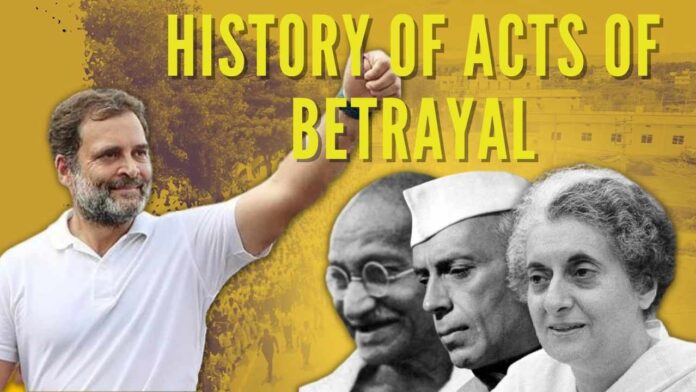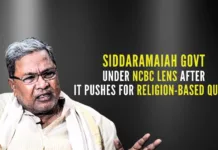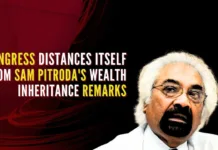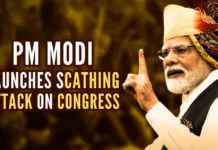
How Congress betrayed India from time to time
Former District Collector (DC) of Jorhat (Assam), Allan Octavian Hume (AO Hume), in consultation with Secretary of State for India, Randolph Churchill, and Indian Governor General Lord Dufferin, founded Indian National Congress (INC) at Bombay on December 28, 1885. He established it with the support of 72 India-based supporters of London, including lawyers, big zamindars, nawabs, and English-educated Indians. Hume himself became its first secretary. He controlled and guided Congress for over 20 years. A number of Britons, including George Yule, William Wedderburn, Alfred Webb, Henry Johan Stedman Cotton, and Annie Besant, were also elected as Congress presidents.
Obviously, Congress was not founded by the three imperialist Britons for the regeneration of the socio-cultural and politico-economic life of the Indians; it was established to further strengthen the imperialist London’s stranglehold on India, help the UK loot and drain India and Indian resources and cause a schism in the Indian society so that it could promote her geo-political and economic interests in the region with utmost ease, and at the cost of Indians. As DC, Hume had the opportunity to go through certain reports filed by CID. The reports had frightened and alarmed him. They suggested that London could witness in India an explosion that would be more dangerous than the one the British East India Company witnessed in 1857. He was convinced that if the British rule in India was to continue, there had to be a political organization that London could use as a “safety Valve” to avert the impending disaster.
That the motive of the founders of Congress was ulterior could be seen from what it did, particularly in 1887, 1905, 1906, 1907, 1909, 1916, 1919, 1922, 1927, 1928, 1937, 1939, 1940, 1942, 1946 and 1947.
The Madras session of Congress in December 1897 under Badruddin Tyabji virtually declared that the interests of Hindus and Muslims were conflicting and mutually exclusive. Tyabji himself said: “As the president of the Madras Congress he rigidly excluded all questions which were mere of a provincial character, or in regard to which the three presidencies (Bombay, Madras, and Bengal) were not practically agreed or where the Hindus were opposed to the Mussalmans as a body or vice versa”.
The Benaras session of Congress in December 1905 really shocked the nation. The reason: M K Gandhi’s political guru, Gopal Krishna Gokhale, as president of Congress declared that “for better, for worse, our destinies are now linked with those of England and the Congress freely recognizes that whatever advance we seek must be within the Empire itself”. Gokhale made this statement at a time when the nation was chaffing and seething with anger in the wake of the communal partition of Bengal. Governor General of India, Lord Curzon, partitioned Bengal on October 16, 1905.
As the situation was turning anti-British with each passing moment, Congress brought Dadabhai Naoroji from London to preside over its Calcutta session in December 1906. (Naoroji was a loyalist of loyalists. He was also the first-ever Indian to become a member of the British Parliament as a Liberal candidate for Central Finsbury in 1892.) To avert the crisis in the Congress, the Calcutta Congress did reluctantly adopt a resolution on Swaraj, Swadeshi, and Boycott to satisfy nationalist of nationalists — also termed extremists — like B G Tilak, Sri Aurobindo, and Bepin Chandra Pal, who all along termed the Congress policy as one of “political mendicancy”, but it became almost clear that the “official Congress” – “moderates” — would not allow the patriot of patriots, including Tilak, to run Congress in the manner they liked.
The Surat Congress of 1907, which was presided over by another loyalist of loyalists or moderate of moderates Rash Behari Ghose, did everything to render ineffective Tilak and other nationalists, who wanted to make Bengal partition a big issue at the national level and use Swadeshi and Boycott as weapons to achieve Swaraj. The result was that Tilak, who gave the slogan “Swaraj is my birthright and I will have it”, Aurobindo, Pal, and many others left Congress and the British loyalists established their full control over Congress. Rash Behari Ghose declared that the Congress “from the very beginning, strictly adhered to constitutional methods of agitation and has never encouraged disloyalty (to London) of any sort or any kind”.
In 1909, 1916, and 1919, India witnessed the rise of a situation that would finally lead to the creation of Pakistan in 1947 and the rape, murder, and displacement of humanity (predominantly Hindu and Sikh) on an unprecedented scale. Congress accepted the divisive Morley-Minto Reforms/ Indian Councils Act of 1909 and Montague-Chelmsford Reforms/ Indian Councils Act of 1919 after registering some sham opposition. The 1909 and 1919 Indian Councils Acts provided for separate Muslim electorates. In Between, Congress and Muslim League signed Lucknow Pact in 1916 under which the former accepted the concept of Muslim electorates. Congress adopted the pact on December 29, 1916, and the League on December 31, 1916.
It needs to be underlined that it was also London, which before and after 1875 had promoted and supported Sir Syed Ahmad Khan and his divisive Aligarh Movement, had prompted and motivated separatist of separatists like Aga Khan and Nawab Salimullah of Dacca to establish the Muslim League at Dacca (now Dhaka) in December 1906 and its objective was to defeat the critics of the Bengal partition and weaken the ardent believers in the concept of Indian Swaraj.
On February 5, 1922, M K Gandhi, who by now had become the sole factor in Congress, unilaterally withdrew from the Non-Cooperation Movement and he took this highly disturbing step at a time when the pressure from below had almost brought the British to India’s knees. The Non-Cooperation Movement was the immediate fallout of April 13, 1919, Jallianwallahbagh (Amritsar) massacre of 100s of innocent unarmed civilians, including women and children, under the order of blood-thirsty General Dyer. Official figures said that Dyer’s order killed 379, but “unofficial accounts gave much higher figures”.
The martyrdom of Lala Lajpat Rai, a close associate of Tilak, Aurobindo, and Pal, on November 17, 1928, as a result of lathi, blows inflicted on him (under the orders of Johan Saunders) while he, along with other nationalists, was protesting against the all-white Simon Commission at Lahore and raising the slogan “Go Back Simon, Go Back Simon”, did create an impression that Congress might finally rise to the occasion and fight against London, but it was not to be. This, notwithstanding the fact that the Lahore Congress under the presidentship of J L Nehru adopted at midnight on New Year’s eve (December 31, 1929) the “creed of Puran Swaraj, and the national tricolour was unfurled amidst cries, no longer just of Bande Mataram, but Inquilab Zindabad” and this, also notwithstanding the fact that M K Gandhi unleashed the so-called Civil Disobedience Movement (1931-1934). M K Gandhi made Nehru president of Congress, despite the fact that 15 of 18 Pradesh Congress Committees (PCCs) bitterly opposed Nehru.
It would be in order to quote what hardcore Leftist historian Sumit Sarkar has said. He, inter-alia, said: “Throughout 1928 and 1929, Gandhi acted as a brake on mounting pressure for another round of all-India mass struggle, aimed this time explicitly at complete independence…He accepted the (Motilal) Nehru Report’s dominion status objective provided the British granted it by the end of 1929, failing which the Congress would be free to go in for Civil Disobedience and Puran Swaraj”.
The point is that Congress under the direction of M K Gandhi repeatedly changed its goalposts and hoodwinked those who were actually sacrificing their all for the cause of Indian freedom. Instead of fighting for Puran Swaraj or even dominion status, Congress contested the provincial council elections in 1937 under the highly divisive Government of India Act, 1935, to fulfill their lust for power and pelf. The 1935 Act didn’t even provide for provincial autonomy in the real sense of the term. On the contrary, it prepared the ground for the country’s partition, despite the fact that the Muslim League suffered humiliating defeats in all of the British Indian Province, including those which were Muslim-majority.
The M K Gandhi’s senseless opposition to the victory of Subhas Chandra Bose as Congress president in 1939 for the second time in a row and his statement that the defeat of Pattabi Sitaramayya at the hands of Bose was his “personal defeat”; his June 1, 1940 statement that rejected outright the Subhas doctrine and said that “we do not seek our independence out of British ruins”; the manner in which he launched the so-called Quit India Movement in August 1942 and the way it collapsed; the acceptance of the highly divisive Cabinet Mission Plan by Congress in 1946; and imposition of J L Nehru as prime minister in the same year all indicated the direction things were heading towards. As was expected, London and its own Congress and league joined hands and the result was the communal partition of India and the creation of Pakistan it in August 1947.
UK, which quit India because of the splendid role of Azad Hind Fauz of Subhas and pressure from below in India, and due to the then prevailing international situation in the aftermath of World War II, London’s bad financial health and the unwillingness of the British army to fight against the determined nationalistic forces in India, again appointed J L Nehru as PM. Lord Mountbatten, under whose supervision India was divided, administered the oath of office to Nehru as Governor General of “independent India”. He held the position till June 21, 1948, when C R Gopalachari took over as the second Governor-General.
What does all this suggest? It suggests that Congress hurt India to the extent it could, promoted the interests of the UK and Muslims to the hilt, and undermined India’s unity and integrity willingly and happily. And did it protect and maintain the unity and integrity of the so-called independent India? The answer is a big NO. On the contrary, it left no stone unturned to further weaken India and promote the geo-political and strategic interests of Pakistan and China. A reference to at least 10 examples would be quite an in order.
- In October 1947, Nehru let down Jammu province and nationalistic Dogras and transferred state power from Jammu to the Kashmir-based separatist and communalist Sheikh Abdullah, thus endangering national security.
- In 1948, Nehru ordered a unilateral ceasefire and ordered the advancing Indian Army not to evict Pakistani invaders from Jammu, Kashmir, and Ladakh. The result was that Pakistan not only got on a platter J&K State’s 85,846 sq km land area but also converted these areas 100 percent. The Nehru’s policy led to the murder of about 80,000 Hindus and Sikhs, the rape of 1000s of Hindu and Sikh girls, and the migration of several 1000 Hindus and Sikhs from Pakistan-occupied-J&K areas to Jammu, Udhampur, and Kathua districts and other places in India.
- On October 17, 1949, Nehru made the Indian Constituent Assembly adopt Article 306A (370) to drive J&K State away from the national mainstream just on the ground that Kashmir was a Muslim-majority region. The result: Abdullah and ilk introduced a separate constitution in J&K and adopted a separate flag for the state.
- On May 14, 1954, Nehru bypassed the Parliament and surreptitiously applied Article 35A to J&K to empower the Kashmiri Abdullahs and ilk to declare all non-Kashmiris persona-non-grata in J&K. It was also applied w.e.f. May 14, 1944, when India was still under London and J&K as a princely state.
- In 1962, Nehru allowed China to occupy Ladakh’s 37,555 sq km territory as his government failed the Indian Army.
- In 1975, Nehru’s daughter and PM Indira Gandhi entered into an accord with Sheikh Abdullah under which the latter had the authority to review all the Central laws and institutions he considered harmful to (Muslim-majority) Kashmir.
- In May 2004, Foreign Minister in the Congress-led UPA, Natwar Singh, told BBC that “the Government of India is prepared to redraw the political map of India if that could lead to the resolution of the Kashmir problem”.
- A week later, Home Minister Shivraj Patil told BBC that “our government (read Manmohan Singh-led government) has decided to reward the moderate militants”.
- On February 25, 2006, PM Manmohan Singh told the delegates to the First Round Table Conference (RTC) on J&K’s political future that “there is the need to evolve a consensus on the issues of self-rule and autonomy within the vast flexibilities provided by the Indian Constitution”
- On March 28, 2006, J&K CM and Congress leader Ghulam Nabi Azad declared at Jammu University that “there should be joint-control of India and Pakistan over the J&K’s waters, power projects, agriculture, sericulture, tourism, forestry, and environment”.
But these constitute only a few of the several such instances which clearly serve to demonstrate that Congress hardly missed any opportunity to cause irreparable damage to national unity and integrity, undermine Indian sovereignty, weaken India’s war machine, hobnob with separatists and protect and promote further interests of non-Hindus, especially Muslims. And what about its highly hostile attitude to Ayodhya, Varanasi, Mathura, Indian Army, Hindu legitimate interests and aspirations, UCC, CAA, NPR, and NRC; unflinching support to China, Pakistan, and similar other hostile nations, Muslim and Christian interests, Bangladeshi and Rohingya intruders; and the composition and complexion of the Rahul Gandhi’s Bharat Jodo Yatra and statements Rahul Gandhi is making all these days?
It’s not really difficult to draw a conclusion that Congress has been systematically harming India and the majority community ever since its inception in 1885. It alone can have the audacity to unleash the “Bharat Jodo Yatra”. The awakened nation is fully aware of the Congress’s antecedents. Under no circumstances, it will walk into Congress’s trap.
Note:
1. Text in Blue points to additional data on the topic.
2. The views expressed here are those of the author and do not necessarily represent or reflect the views of PGurus.
PGurus is now on Telegram. Click here to join our channel and stay updated with all the latest news and views
For all the latest updates, download PGurus App.
- ‘Kashmir My core constituency’: Revisiting July 12, 2003 to understand politics, Omar Abdullah-style - March 15, 2024
- Total deviation from traditional approach: Seven takeaways from PM Modi’s March 7 Srinagar visit - March 9, 2024
- Status of political parties: Why is further J&K reorganization imperative? - March 1, 2024











It is time that people like you and many youngsters who have taken up the cause recently to bring the TRUTH to the people should also quickly support rewriting the History of India; We as students have been made to study the FALSE history of India that is still being followed over many generations. The damage caused by these people is much more deeper than the one caused by the invaders from 7th century and again by British traders who ruled from 15th Century. Actually, all these reflect on their upbringing & their mindset which need to exposed to the outside world, especially to Bharatwasis. Great and continue with your great work.